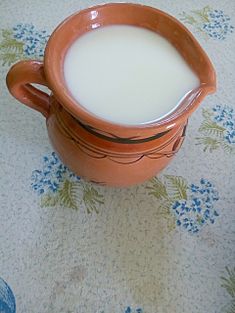Leben (milk product) facts for kids

A jar of Leben.
|
|
| Course | Breakfast, Lunch |
|---|---|
| Region or state | Middle East, Northern Africa |
| Serving temperature | Cold |
| Main ingredients | Milk, Yogurt, Half & Half |
The term Leben (pronounced like "LEH-ben") refers to a special type of fermented milk food or drink. When milk is "fermented," it means good bacteria have changed its sugars into acids. This gives Leben a slightly sour taste and a thicker texture. It's very popular in the Middle East and North Africa. Depending on the region, Leben can be like yogurt or like buttermilk. People enjoy Leben for breakfast, lunch, or dinner.
How Buttermilk Leben is Made
In many parts of Arabia and North Africa, Leben is a drink similar to buttermilk. To make it, fresh milk is left to ferment for about 24 hours. This allows the milk to thicken and develop its unique flavor.
After fermenting, the milk is churned. Churning is a process where the milk is vigorously stirred or shaken. This separates the butter from the liquid. The liquid that is left behind is the buttermilk Leben. This traditional drink can stay fresh for several days, even without refrigeration. Today, many companies also make Leben in factories.
How Yogurt Leben is Made
In the Levant region (which includes countries like Lebanon, Syria, Jordan, and Palestine) and some other parts of Arabia, Leben is more like a thick yogurt. To make this type of Leben, milk (usually whole milk) is first boiled.
After boiling, the milk is cooled down a bit. Then, a small amount of existing yogurt or previously made Leben is added. This "starter" contains the good bacteria needed for fermentation. The mixture is then left to cool overnight. During this time, the bacteria work their magic, turning the milk into thick, creamy yogurt-like Leben.
Leben's Story in Israel
In the early 1900s, Jewish people living in what was then called Ottoman Palestine started making a lot of yogurt-style Leben. They called it "leben," which comes from an Arabic word meaning "white." This is similar to the Hebrew word "lavan," which also means white.
Leben became super important for Jewish people during the time when Britain ruled the area. It was a basic food that everyone ate. After Israel became an independent country, there was a time called the tzena (austerity) period. During this time, food was rationed, meaning people could only buy a certain amount. Leben was considered a basic food and was part of the government's rationing system.
Because of its importance during the tzena period, Leben became a big part of Israeli culture. In the 1970s, you could find Leben with strawberry or chocolate flavors in stores. However, these sweet versions are not as common today. Most of the Leben you find now is plain and unflavored, just like the traditional kind.
 | Emma Amos |
 | Edward Mitchell Bannister |
 | Larry D. Alexander |
 | Ernie Barnes |

